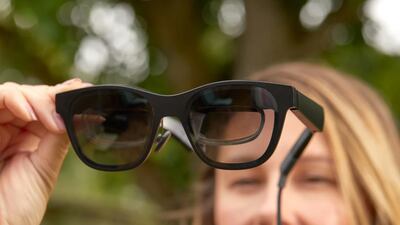XRAI Glass, a maker of augmented reality glasses that translate speech to closed-caption text for hearing-impaired users, has chosen Saudi Arabia as the entry point for its expansion into the Middle East.
The Arab world's biggest economy is “at the forefront of technology and is investing in it”, co-founder Mitchell Feldman told The National in an interview at the Leap technology exhibition in Riyadh this week.
The London-based company is seeking to work with the right manufacturers in the kingdom, he said.
“The reason why we chose to first look at Saudi Arabia is because the country seems to be a great early adopter of technology in the Middle East,” Mr Feldman said.
“It is also at the forefront of helping companies and people. In this industry, it’s a caring community, so it’s a natural habit for XRAI Glass to start its journey into the Middle East here.”
Other Middle East countries are on XRAI's radar, especially the UAE, and the company is “certainly considering” building a research and development centre in the region, he said.
“What is highly appealing to us is looking at teaming with an academic entity, such as an established university in Saudi Arabia and the UAE, to help us look further at the academic research.”
Smart glasses are a growing niche as manufacturers continue to add new functions and use cases in a number of industries, resulting in stiff competition in the market.
The segment has also received a boost due to the growing popularity of the metaverse.
The first major attempt to take these devices mainstream came with the launch of Google Glass in 2013, which struggled with a number of problems, including utility, design and a hefty $1,500 price tag.
In September 2021, Meta Platforms, then known as Facebook, introduced its Stories smart glasses in collaboration with eyewear maker Ray-Ban. Chief executive Mark Zuckerberg hinted at more projects last year.
Major technology companies such as Microsoft, Amazon and Snapchat, with its Spectacles, are also producing smart glasses.
Apple and Samsung, the world's two biggest smartphone manufacturers, have also long been rumoured to be working on their own versions.
Apple, in particular, is reportedly on track to release a $3,000 mixed reality headset later this year.
The global smart glass market is projected to hit $8.2 billion by 2027, from an estimated $5 billion in 2022, at a compound annual growth rate of 10.4 per cent, data from research company Markets and Markets shows.
“The accessibility market is our biggest focus. We want to empower people with hearing impairments and those with neurodivergent issues,” Mr Feldman said.
co-founder of XRAI Glass
Saudi Arabia's Ministry of Health has put a special focus on those with hearing impairments, particularly with the “We Are With You” initiative, and explicitly forbids any form of discrimination, according to its website.
There are more than 229,000 people who are hearing-impaired in Saudi Arabia, who are “greatly ignored, particularly at public departments and places due to lack of interpreters”, the General Authority for Statistics said in a recent report.
The capabilities of smart glasses have significantly improved over time, Mr Feldman said.
XRAI Glass has also adopted advanced privacy and security measures by using Web3 architecture, which is decentralised, he said.
Web3 is the emerging new concept of the World Wide Web, with blockchain, decentralisation, openness and greater user utility among its core components.
“This means all content and data lives with the user. Nothing is stored on the cloud, it is all user owned,” Mr Feldman said.
“Many companies are now looking towards Web3 architecture over traditional web, as users control their data.”


